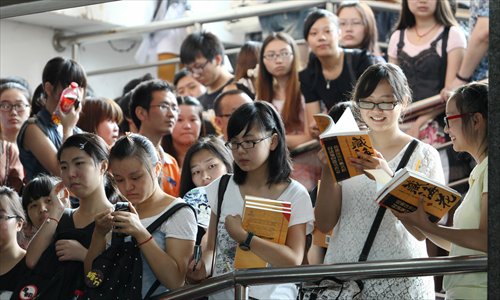Battle for legitimacy
Source:Global Times Published: 2013-11-10 19:23:01

Fans wait for online author Xu Lei at a promotion in Wuhan, Hubei Province, August 25, 2012. Photo: CFP
Chinese authors of literature published online are being formally admitted by the biggest official association for writers in the country.
As confirmed by the Changjiang Daily earlier this month, the China Writers Association (CWA), which only accepts members through a nomination process from provincial associations, is preparing to found an organization dedicated to online writers. Once established, it would be the most prestigious association for online writers in China, a step that recognizes writers who have often been regarded as amateurs.
Opening up the circle
In June, Ren Haiyan (who writes as Tong Hua, the author of Treading on Thin Ice), Wu Xuelan (known as Liulianzi, the author of The Legend of Zhenhuan) and 14 other online writers were invited to join CWA, revealing a paradigm shift in literary circles.
Pu Su, the former chief editor of the literature section of Tianya Club, one of the most popular online communities in China, accepted a request from the CWA in June to recommend well-known online writers to be inducted as the first group of members in the new organization. He already handed in a list of over 10 authors and predicted that the finalists would be announced at the end of this year, he told the Changjiang Daily.
Pu said the founding of this organization is an acknowledgment of the works by online writers, and he hoped the organization would be creative in function and flexible in management, offering a platform for online authors to communicate with others, select materials, find financial support and get professional training.
Getting on the same page
With support from CWA, Online Literature University was established by digital publishing company ChineseAll.com on October 30, offering courses for online writers such as one-by-one review, customized courses related to publishing and movie adapting, and literature and art theories studies.
These public courses could help online authors to be on the right way with higher quality works, said Ma Ji, the deputy editor of CWA's official website.
Nobel Prize-winning author Mo Yan was appointed as its chancellor. Mo said at the opening ceremony that the barrier between traditional literature and online literature has vanished with the passage of time.
Dong Zhilei, the chairman of the board of ChineseAll.com, said at the opening ceremony that the public university's aim is to solve the problem of not knowing how to improve online writers, or how to offer training at all the different levels online writers bring to the table. He hoped to make Chinese online literature more mainstream, and able to impact global audiences.
Trendsetters
With the development of new media, new types of literature created mainly by young authors and published only online are emerging, and even starting to play influential roles in contemporary literature.
Besides the traditional Chinese novel types such as romance, historical and swordsmen stories, some new types such as fantasy, college life, time traveling and tomb raiding are attracting today's online readership, according to a report in the Zhejiang Daily.
Xia Lie, who once worked for Cloudary, the Internet literature arm of Chinese media conglomerate Shanda Group, told the Zhejiang Daily that there are more than 1.6 million authors registered on qidian.com, which functions under Cloudary. About 200,000 of them have signed contracts with the website. It sees an average of 500 new novels posted every day, and among the works, stories with more than 1 million words are not an oddity. To understand the scale of a 1-million word book, consider that the average 280-page novel in Chinese is closer to 300,000 words.
With the help of virtual technology, many literature websites like qidian.com record readers' preferences in order to promote similar books. Online authors then can choose to self-select by publishing their works on websites famous for their genre in order to best reach readers that are interested in their literary niche.
Writers respond
When news of the new online writers association leaked to the public, local writers associations had their own response.
Zhang Wei, a star author on qidian.com who writes under the pen name Tangjiasanshao, was announced as the director of Beijing online writers association on October 31. Zhang said in an interview with the Youth Daily that the founding of these organizations is a great step forward for online writers. As the rapid publishing and spreading of online literature causes a series of piracy problems, Zhang hoped these official organizations would help protect them and give them a voice.
Fang Fang, the chairman of the Hubei Writers Association, told the Changjiang Daily that the provincial writers association would not set up a branch especially for online writers quite yet.
According to Fang, the Hubei Writers Association changed the rules for enrollment to tentatively accept online writers. The Hubei Literature Awards, held on a biennial basis, included a cutting-edge prize especially for online writers under 40.
"Of course, as more and more people prefer to read on screens, online literature has an increasing influence," she said. "We should keep an eye on it."
Posted in: Books